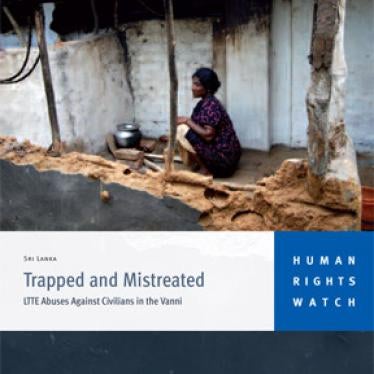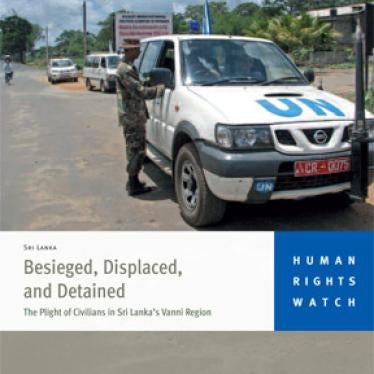(New York) - The Sri Lankan government should immediately cease its indiscriminate artillery attacks on civilians in the northern Vanni region and its policy of detaining displaced persons in internment camps, Human Rights Watch said in a report released today. Since early January 2009, civilian casualties have skyrocketed in the fighting between the Sri Lankan armed forces and the separatist Liberation Tigers of Tamil Eelam (LTTE).
The 45-page report, "War on the Displaced: Sri Lankan Army and LTTE Abuses against Civilians in the Vanni," is based on a two-week fact-finding mission to northern Sri Lanka in February. The government has prohibited journalists and human rights monitors from going to the battle zone in the Vanni, making access to information difficult.
"This ‘war' against civilians must stop," said James Ross, legal and policy director at Human Rights Watch. "Sri Lankan forces are shelling hospitals and so-called safe zones and slaughtering the civilians there."
Human Rights Watch also called on the LTTE to allow civilians to leave the war zone, stop shooting at those who try to flee to government-controlled territory, and cease deploying forces near populated areas.
Human Rights Watch said that both the Sri Lankan army and the LTTE were responsible for the dramatic increase in civilian casualties during the past month - approximately 2,000 killed and another 5,000 wounded, according to independent monitors on the ground.
As the territory held by the LTTE has decreased - now a short, narrow strip on the northeast coast of the island - displaced persons under their control have been dangerously forced into a smaller and smaller space. In violation of the laws of war, the LTTE has refused to allow civilians to flee the fighting and repeatedly has shot at those who have tried to reach government-held territory. The LTTE continues to subject civilians under their control, including children, to forced recruitment and deadly forced labor on the battlefield.
"With each battlefield defeat, the Tamil Tigers appear to be treating Tamil civilians with increased brutality," said Ross. "They've shot at those trying to flee and stepped up forced recruitment and forced labor."
The Sri Lankan government has indicated that the ethnic Tamil population trapped in the war zone can be presumed to be siding with the LTTE and treated as combatants, effectively sanctioning unlawful attacks. Sri Lankan forces have repeatedly and indiscriminately shelled areas crowded with displaced persons. This includes numerous reported bombardments of government-declared "safe zones" and of the remaining hospitals in the region.
The plight of the region's civilians has been made worse by the government's decision in September 2008 to order most humanitarian agencies out of the Vanni. Government efforts to bring in food, medical supplies, and other relief - with a minimal role for the United Nations - have been insufficient. Continued fighting, lack of oversight, and the manipulation of the delivery of aid by government forces and the LTTE have all contributed to the continuing humanitarian crisis.
Displaced persons in the Vanni who escape to what they hope is safety within government-controlled areas are instead put in internment centers masquerading as "welfare villages" in Vavuniya and nearby locations. The displaced persons, including entire families, detained in these military-controlled, barbed-wire camps are denied their liberty and freedom of movement, Human Rights Watch said.
"All civilians who manage to escape the Tamil Tigers are held by the government in squalid military-controlled camps and hospitals with little access to the outside world," said Ross. "The government seems to be trying its best to keep its role in their ordeal away from public scrutiny."
The government for security reasons should be openly screening new arrivals, but it is instead secretly taking away apparent LTTE suspects to arbitrary detention or possible enforced disappearances. Impartial humanitarian agencies should be permitted to monitor the screening process.
The hospital in Vavuniya mirrors the town's internment centers. When Human Rights Watch visited, it lacked even the most basic necessities: many of the hospital beds had no sheets, blankets, or pillows. Despite the obvious lack of capacity to attend to the needs of the wounded, the hospital personnel reportedly were instructed by the authorities not to ask for any assistance from the international agencies, and very few agencies were allowed access. Relatives have had difficulty seeing patients, and some have later been visited by the security forces.
Human Rights Watch called on both the Sri Lankan government and the LTTE to act immediately to stop the ongoing slaughter of civilians. Both parties should establish a humanitarian corridor and respect the laws of war. The LTTE should allow civilians to leave the war zone, and the army should stop shelling near densely populated areas, safe zones, and hospitals. Displaced civilians who reach the government side should be assisted but not interned. And the government should permit independent media and human rights organizations to go to the conflict area.
Accounts from "War on the Displaced":
One man described shelling of the "safe zone" that came from Sri Lankan army positions on January 22:
- "There was heavy shelling, especially where people gathered - near the hospital and where the UN distributed food. People were running around, crying. There was no shelter. Some were trying to hide under trees, like animals. Two shells landed 50 meters ahead of me. I was very afraid. When I reached the place where the shells landed, I saw that one person had been injured and was being carried away. Two people were lying by the roadside, one young man and one man about 55. They were both dead and covered in blood. The shelling continued during the day. Later I heard that many people were injured and killed."
A 35-year-old father of three described how LTTE cadres fired upon his group trying to flee to government-occupied territory:
- "Some 150 people started out together, but when we tried to leave, at Suthanthirapuruam, the LTTE tried to stop us. There was only a narrow path to leave by. The LTTE caught us. There was fighting, arguments. They were shooting at us. Many people were injured and killed. It was shocking to see. Only 65 were in my group when we came out. One father was carrying his child on his back. As they were running from the LTTE, he was holding him by the arms so hard - in order not to lose him - that he broke both of the child's arms."
A local resident described LTTE forced recruitment:
- "The workers were taken to the front line to dig bunkers, collect weapons from killed cadres and Sri Lankan Army soldiers, and so on. It was very dangerous for civilians - about 25 of my neighbors were killed while doing this work. They did not receive any training - the LTTE cadres fetched them from their homes and the next day brought their dead bodies back."
A local relief worker described a visit to a government "welfare center" for displaced persons:
- "I spoke to one woman in the camp - she was crying and screaming. It turned out that her elderly mother, who had been injured and admitted to the hospital, died there on February 7. The elderly woman's body was given to the son, who lived in Vavuniya, but her daughter was not allowed to leave the camp even to attend her mother's funeral. She was in agony because she couldn't pay respects to her mother."








